{ Bouncing Back Stronger } Life can sometimes feel like a never-ending rollercoaster of challenges, but it’s in those moments that resilience becomes our greatest asset. In the face of adversity, the art of building resilience allows us to bounce back stronger than ever before. Whether it’s dealing with a personal loss, navigating a difficult career transition, or overcoming a health setback, resilience empowers us to rise above the obstacles with courage and determination.
In this article, we will explore the strategies and mindset shifts that can help us cultivate resilience in the face of life’s challenges. From reframing negative experiences to developing a growth mindset, we will uncover practical tips and techniques that can strengthen our emotional well-being and enhance our ability to thrive in the face of adversity.
By understanding the art of building resilience, we can transform setbacks into stepping stones and overcome life’s challenges with grace and resilience. So, let’s dive in and learn how to embrace our inner strength to bounce back stronger than ever before.
Understanding resilience and its importance
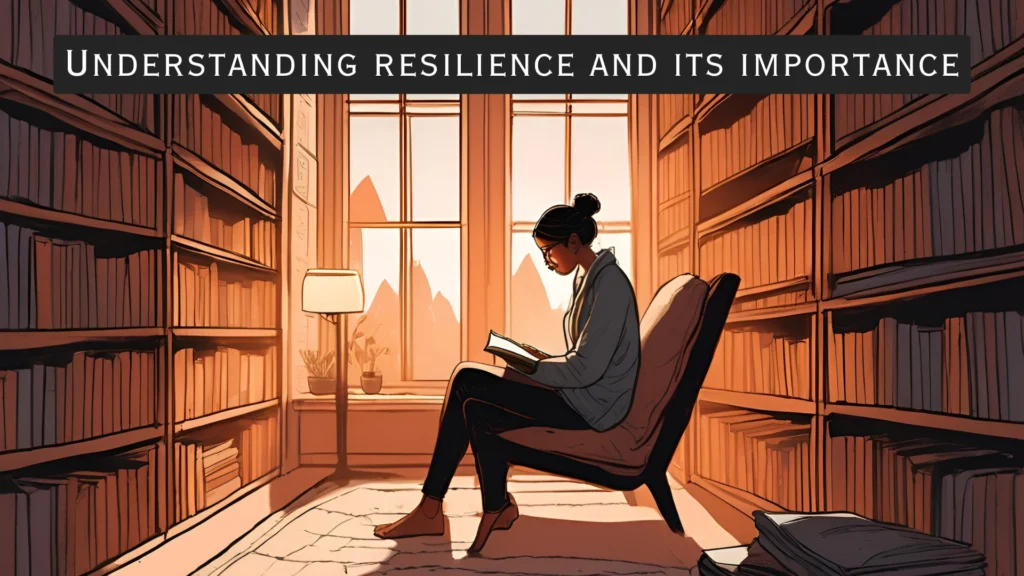
Resilience is the ability to bounce back from adversity, trauma, tragedy, threats, or significant sources of stress. It is the capacity to adapt and thrive in the face of life’s challenges, whether they are personal, professional, or even global in nature. Resilience is not just about surviving – it’s about emerging from difficult circumstances stronger, wiser, and more capable than before.
At the core of resilience is the understanding that life is full of ups and downs, and that it’s not the challenges themselves that define us, but rather how we choose to respond to them. Resilient individuals possess a unique combination of cognitive, emotional, and behavioral skills that allow them to navigate through hardships with grace and determination. They are able to maintain a positive outlook, find meaning in their struggles, and draw upon their inner resources to overcome obstacles and grow from their experiences.
Cultivating resilience is essential for our overall well-being and success. When we develop resilience, we become better equipped to manage stress, bounce back from setbacks, and maintain our mental and physical health in the face of adversity. Resilience also enables us to adapt more effectively to change, pursue our goals with greater determination, and find purpose and meaning in our lives, even during the most challenging times. By embracing the art of building resilience, we can transform our struggles into opportunities for growth and self-discovery.
The science behind resilience
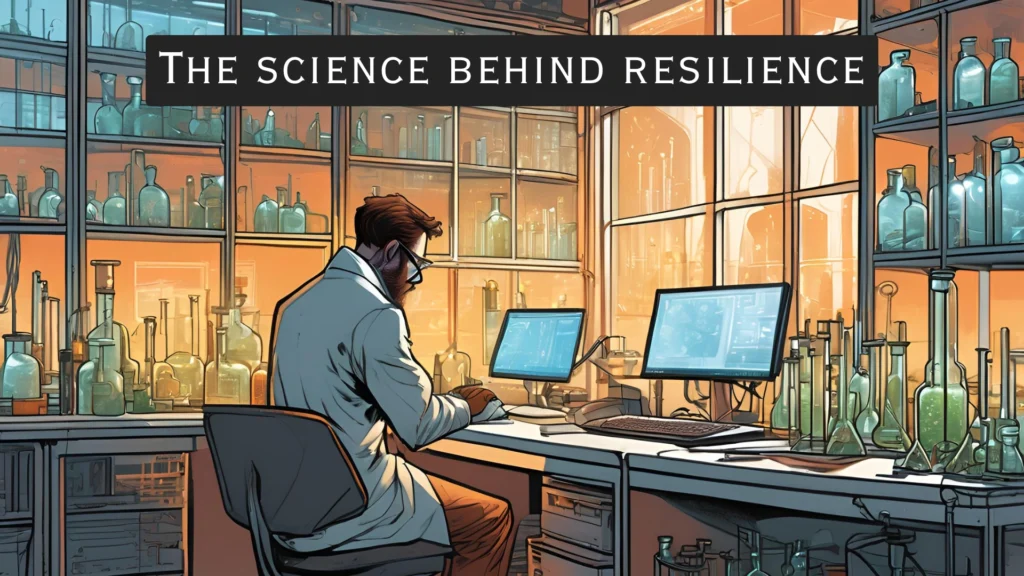
At the heart of resilience lies a complex interplay of biological, psychological, and social factors. Extensive research in the field of positive psychology has shed light on the various components that contribute to an individual’s capacity for resilience.
From a biological perspective, resilience is linked to the brain’s ability to adapt and recover from stress. Studies have shown that individuals with higher levels of resilience tend to have more efficient stress response systems, with the ability to regulate their emotions and physiological reactions more effectively. This is attributed to the brain’s neuroplasticity, or its capacity to reorganize and form new neural connections in response to experiences and environmental changes.
Psychologically, resilience is closely tied to an individual’s cognitive and emotional resources. Resilient people often possess a strong sense of self-efficacy, the belief in their ability to overcome challenges and achieve their goals. They also tend to have a positive, optimistic outlook, and the ability to reframe negative experiences in a constructive way. Additionally, resilient individuals are adept at problem-solving, emotion regulation, and the use of adaptive coping strategies, all of which contribute to their ability to bounce back from adversity.
The impact of resilience on mental and physical health
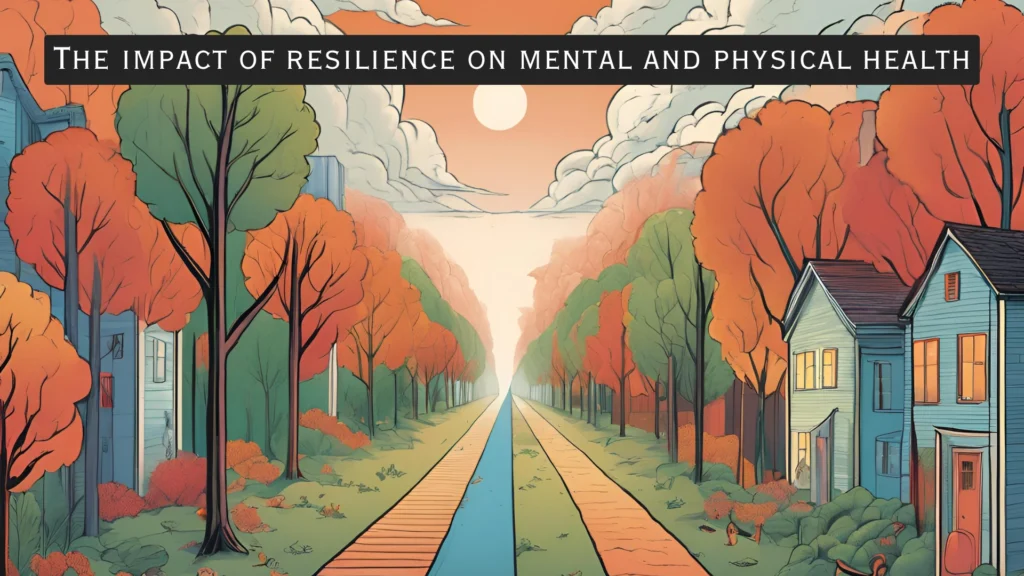
Resilience has a profound impact on our overall well-being, both mentally and physically. When we cultivate resilience, we are better equipped to navigate the ups and downs of life, maintaining a sense of balance and stability even in the face of significant challenges.
From a mental health perspective, resilience has been linked to lower rates of depression, anxiety, and other stress-related disorders. Resilient individuals are more likely to possess a positive self-image, maintain healthy relationships, and find purpose and meaning in their lives, all of which contribute to their emotional well-being. Furthermore, resilience has been shown to enhance cognitive function, improve decision-making abilities, and foster a greater sense of personal growth and self-actualization.
The benefits of resilience extend to physical health as well. Resilient individuals tend to have stronger immune systems, lower levels of inflammation, and better overall physical functioning. This is largely due to the fact that resilience helps to mitigate the negative physiological effects of stress, which can otherwise take a toll on the body. By developing resilience, we can better manage our stress levels, engage in healthier behaviors, and maintain a greater sense of overall well-being, even in the face of physical challenges.
Building resilience through self-awareness and self-care
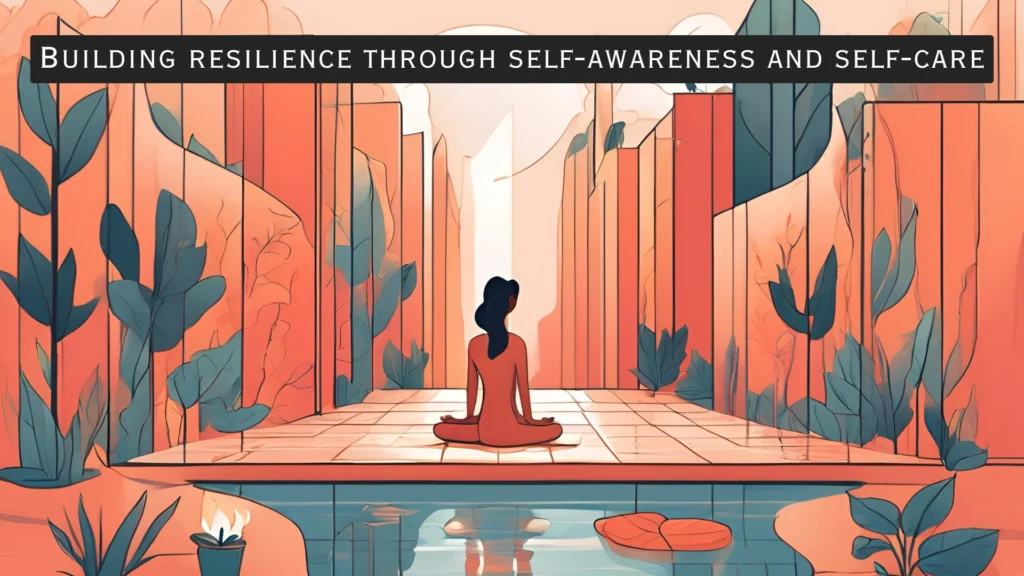
Cultivating resilience begins with a deep understanding of ourselves and a commitment to self-care. By developing self-awareness, we can identify our strengths, weaknesses, and the unique resources we can draw upon in times of adversity. This self-knowledge allows us to build a solid foundation for resilience, empowering us to navigate challenges with greater clarity and effectiveness.
One of the key aspects of self-awareness is the ability to recognize and manage our emotions. Resilient individuals are adept at identifying their feelings, understanding the underlying causes, and finding healthy ways to process and express them. This emotional intelligence enables them to maintain a sense of balance and control, even in the midst of stressful or overwhelming situations.
Alongside self-awareness, the practice of self-care is essential for building resilience. This involves engaging in activities and habits that nourish our physical, mental, and emotional well-being. This may include regular exercise, healthy eating, quality sleep, mindfulness practices, and taking time for leisure and relaxation. By prioritizing self-care, we create a strong foundation of personal resources that can sustain us through the challenges we face.
Developing a growth mindset for resilience
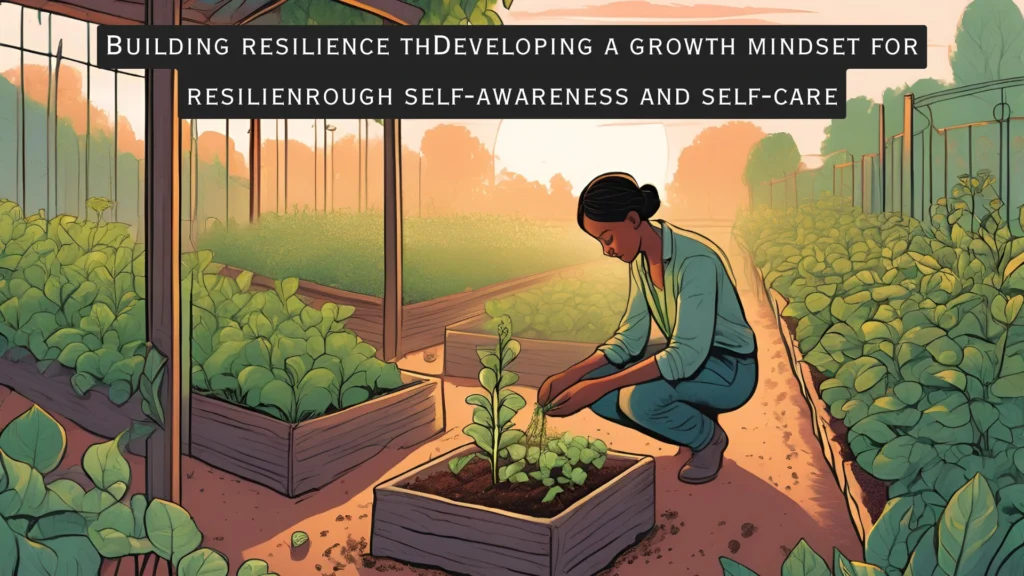
Closely linked to the cultivation of self-awareness and self-care is the development of a growth mindset, a crucial component of building resilience. A growth mindset is the belief that our abilities and talents can be developed through dedication, hard work, and a willingness to learn from our experiences, including our failures.
Individuals with a growth mindset approach challenges and setbacks as opportunities for growth and improvement, rather than as threats to their self-worth or capabilities. They understand that success is not about innate talent or luck, but rather the result of a persistent, learning-oriented approach. This mindset empowers them to embrace challenges, persist in the face of obstacles, and view mistakes as valuable learning experiences.
In contrast, a fixed mindset, where individuals believe their abilities are set in stone, can hinder the development of resilience. People with a fixed mindset may be more inclined to avoid challenges, give up easily, and see failures as a reflection of their inherent limitations. By cultivating a growth mindset, we can transform our relationship with adversity, viewing it as a catalyst for personal growth and the expansion of our capabilities.
Cultivating a strong support system

Building resilience is not a solitary endeavor; it is often strengthened and sustained by the presence of a strong support system. Surrounding ourselves with a network of supportive individuals, whether they are family, friends, mentors, or members of a community, can provide us with the emotional, practical, and social resources we need to navigate life’s challenges.
These supportive relationships offer a safe space for us to share our struggles, receive empathy and understanding, and gain valuable perspectives and insights. They can also provide practical assistance, such as help with daily tasks, financial support, or access to professional resources. By cultivating a strong support system, we create a sense of belonging and connectedness that can bolster our resilience and help us feel less alone in our journey.
Additionally, being part of a supportive community can foster a sense of purpose and meaning, which are essential elements of resilience. When we feel that we are part of something larger than ourselves, we are more likely to find the motivation and determination to overcome obstacles and contribute to the well-being of others.
Strategies for managing stress and adversity
Resilience is not about eliminating stress or adversity from our lives; it is about developing the tools and strategies to effectively manage and navigate through challenging situations. By adopting a range of coping mechanisms, we can build our capacity to bounce back and emerge stronger from life’s difficulties.
One key strategy for managing stress and adversity is the practice of mindfulness. By cultivating present-moment awareness and acceptance, we can learn to observe our thoughts and emotions without becoming overwhelmed by them. This allows us to respond to stressful situations with greater clarity and composure, rather than reacting impulsively or succumbing to negative thought patterns.
Another effective strategy is the use of problem-solving skills. Resilient individuals are adept at identifying the root causes of their challenges, breaking down problems into manageable steps, and implementing practical solutions. This proactive approach empowers us to take control of our circumstances and find constructive ways to overcome obstacles.
Learning from failure and embracing setbacks

Resilience is not just about bouncing back from adversity; it is also about embracing the valuable lessons that can be learned from our failures and setbacks. In fact, the ability to learn and grow from these experiences is a hallmark of resilience.
When we face a setback or experience failure, it can be tempting to view it as a personal shortcoming or a reflection of our limitations. However, resilient individuals understand that failure is a natural part of the learning process and an opportunity for growth. They approach these experiences with curiosity, self-compassion, and a willingness to reflect on what they can do differently in the future.
By adopting a growth mindset and reframing our failures as learning opportunities, we can develop a more nuanced understanding of our strengths, weaknesses, and the strategies that work best for us. This process of self-reflection and continuous improvement is essential for building resilience and becoming more adaptable in the face of life’s challenges.
The role of gratitude in building resilience
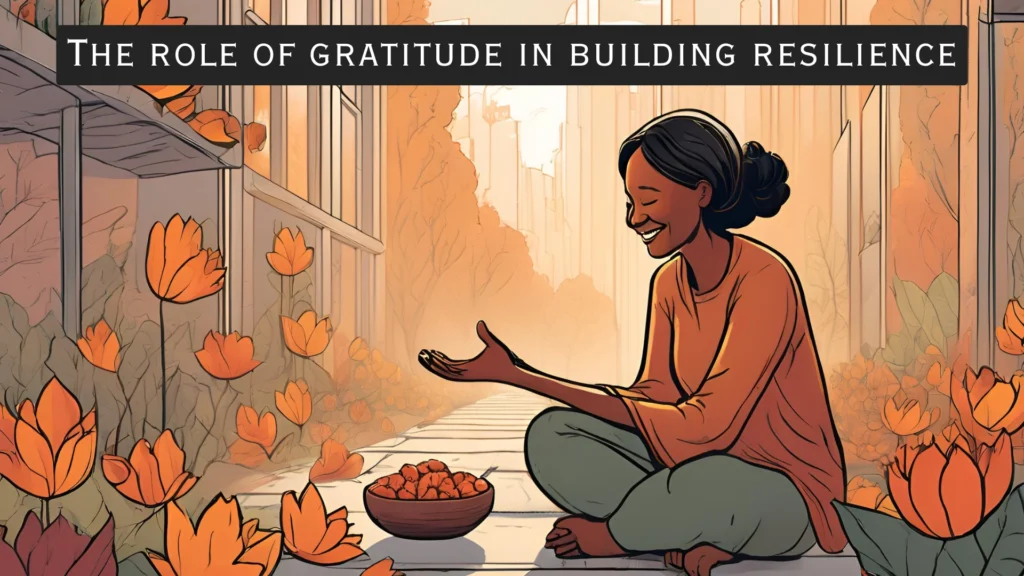
Gratitude, the practice of acknowledging and appreciating the positive aspects of our lives, plays a pivotal role in the development of resilience. By cultivating a grateful mindset, we can shift our focus away from the difficulties we face and instead recognize the resources, support, and blessings that are present in our lives.
Research has shown that the regular practice of gratitude can have a profound impact on our mental and emotional well-being. Grateful individuals tend to experience higher levels of positive emotions, increased life satisfaction, and greater resilience in the face of adversity. This is because gratitude helps to rewire our brain’s neural pathways, fostering a more optimistic and resilient outlook on life.
When we consciously express gratitude, we activate the reward centers in our brain, releasing feel-good neurotransmitters like dopamine and serotonin. This positive emotional state can help to buffer us against the negative effects of stress and adversity, providing a sense of perspective and a renewed appreciation for the good in our lives. By cultivating a daily gratitude practice, we can build a strong foundation of resilience that will serve us well in the face of life’s challenges.
Conclusion: Embracing resilience as a lifelong journey
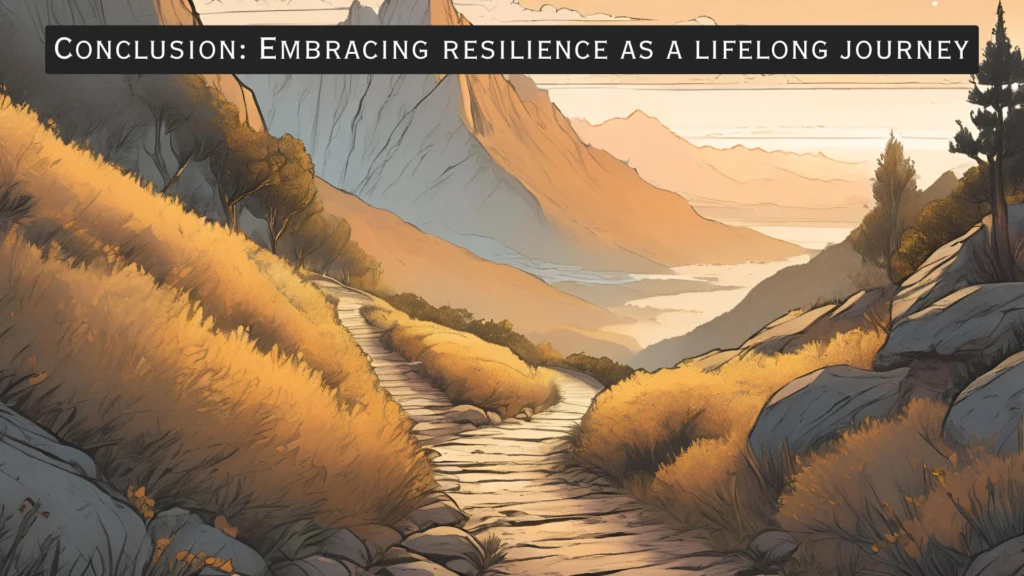
Resilience is not a destination, but rather a lifelong journey of personal growth and transformation. It is the art of navigating the ups and downs of life with courage, adaptability, and a commitment to self-improvement. By embracing the strategies and mindset shifts outlined in this article, we can develop the resilience needed to bounce back stronger from life’s challenges and emerge as our best selves.
Building resilience is not a one-size-fits-all process; it requires a personalized approach that takes into account our unique circumstances, strengths, and areas for growth. However, the core principles of self-awareness, self-care, a growth mindset, a strong support system, effective stress management, and the power of gratitude can serve as a solid foundation for anyone seeking to cultivate greater resilience.
As we navigate the ebbs and flows of life, let us remember that resilience is not about perfection or the absence of struggle, but rather the ability to adapt, learn, and grow from our experiences. By embracing resilience as a lifelong journey, we can transform our setbacks into opportunities for personal development, deepen our connection to ourselves and others, and ultimately, lead more fulfilling and meaningful lives.